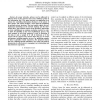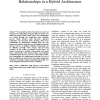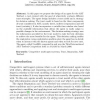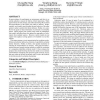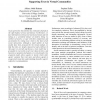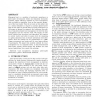127
click to vote
ICC
2009
IEEE
14 years 11 months ago
2009
IEEE
In sensor networks, privacy can be addressed in different levels of the network stack and at different points of the information flow. This paper presents an application level sche...
126
click to vote
JCP
2006
15 years 2 months ago
2006
Trust models provide a framework to create and manage trust relationships among the different entities of a Public Key Infrastructure (PKI). These trust relationships are verified ...
110
click to vote
CLEIEJ
2008
15 years 2 months ago
2008
E-mail services are essential in the Internet. However, the current e-mail architecture presents problems that open it to several threats. Alternatives have been proposed to solve...
138
click to vote
CAEPIA
2009
Springer
15 years 3 months ago
2009
Springer
In this paper we propose the design of an agent for the ART Testbed, a tool created with the goal of objectively evaluate different trust strategies. The agent design includes a tr...
158
click to vote
CIA
2008
Springer
15 years 4 months ago
2008
Springer
Abstract. We present a method that improves the results of network intrusion detection by integration of several anomaly detection algorithms through trust and reputation models. O...
115
click to vote
ATAL
2008
Springer
15 years 4 months ago
2008
Springer
In open settings, the participants are autonomous and there is no central authority to ensure the felicity of their interactions. When agents interact in such settings, each relie...
116
click to vote
HICSS
2000
IEEE
15 years 6 months ago
2000
IEEE
At any given time, the stability of a community depends on the right balance of trust and distrust. Furthermore, we face information overload, increased uncertainty and risk takin...
112
click to vote
CIKM
2001
Springer
15 years 6 months ago
2001
Springer
Managing trust is a problem of particular importance in peer-to-peer environments where one frequently encounters unknown agents. Existing methods for trust management, that are b...
132
click to vote
SIGECOM
2003
ACM
15 years 7 months ago
2003
ACM
Peer-to-Peer eCommerce communities are commonly perceived as an environment offering both opportunities and threats. One way to minimize threats in such an open community is to us...
141
click to vote
IPPS
2003
IEEE
15 years 7 months ago
2003
IEEE
The peer-to-peer approach to design large-scale systems has significant benefits including scalability, low cost of ownership, robustness, and ability to provide site autonomy. ...
